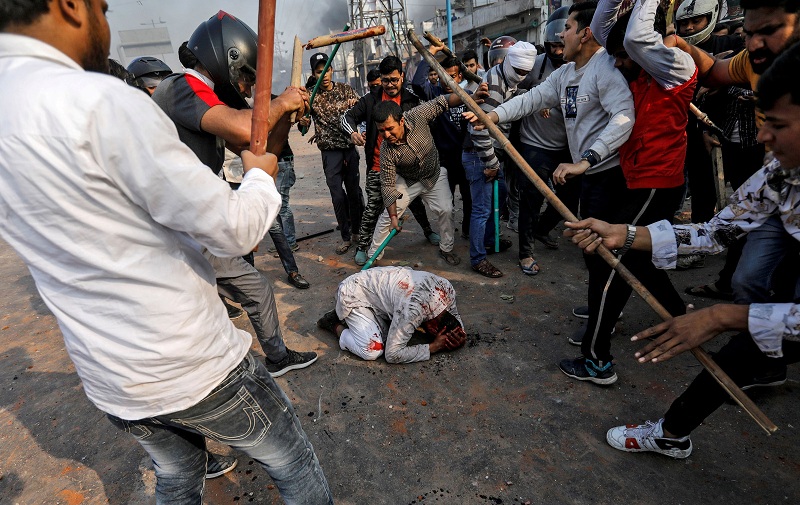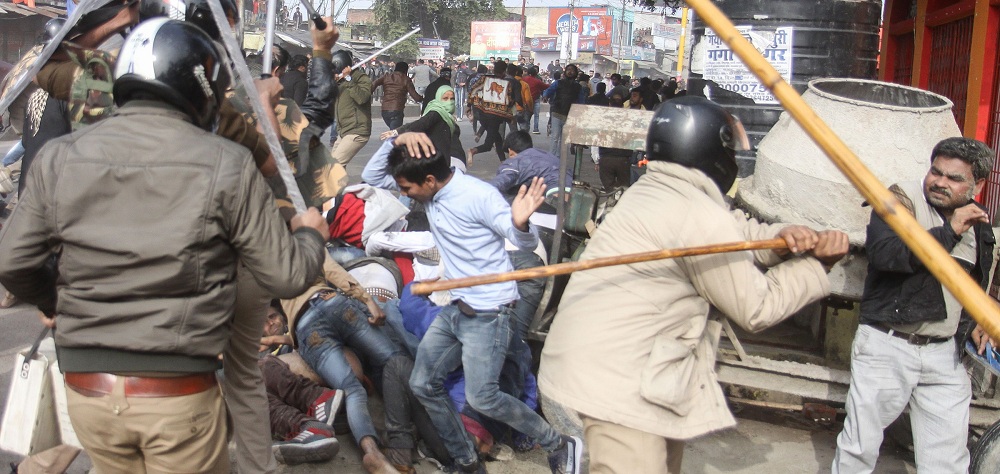Alwaght- Following US President's visit to India, the violence against the country's Muslims rose to a level unprecedented in the recent decades.
Donald Trump's trip to India has once again ignited the fire under the ash of religious disputes in India. Hindu mobs attacked Muslims protesting Trump’s visit to the country and also the government’s discriminatory citizenship law. The hardline, nationalist Hindus, who had the police backing, did whatever they could to persecute the Muslim citizens in three days. Reports suggest that so far at least 50 Muslims were killed and over 300 were injured.
The images circulating online from the violence in India over the past few days were horrible and revealed the depth of the tragedy. The crimes were so heinous that it could be said that they were unmatched since the 1984 confrontation between the extremist Hindus and the Muslims.
Trump reignited India anti-Muslim brutality
The Los Angeles Times newspaper reported that Trump during his two-day visit to India failed to condemn India’s controversial new citizenship bill that is largely discriminatory to the Muslims of the country. It added that Trump was very confused in the press conference and struggled to evade the questions about the religious brutality in India.
Some said that Trump’s speech in the stadium in the presence of several thousand audiences, in which he talked about the need to tackle what he called “Islamic terrorism” and asked the Indians to separate the Muslims from the Hindu community, was the main cause for the new violence that for several decades was latent. His words spurred the Hindu mobs to violently attack Muslims and their holy places. The antipathy against the Muslims, analysts argue, can motivate enmity among people and push the country towards religious and civilization conflicts.
Why did the protests begin?
Trump is known for his racist approaches and that is what many in the US admit. His racism against the Muslims is even worse and that was the main reason for the protests of the Indian Muslims who at the same time find themselves under the discrimination of the right-wing government of Prime Minister Narendra Modi.
Thousands last week demonstrated in various cities across the country in protest to Hindu violence against the Muslim world and also Trump trip to the country. As the protests unfolded, hardline Hindus attacked Muslims’ houses and mosques.
The violence has roots in an Indian parliament bill late in 2019. The controversial law enables many, but not Muslims, to receive Indian citizenship.
Journalists closely watching the clashes reported that security forces were responsible as they failed to take measures to prevent looting and burning of the Muslim sites and homes.
Crimes against Muslims
According to reports, as a result of aggravated anti-Muslim brutality in India, especially in northeastern New Delhi, several Mosques were set fire to. Even, some Muslims were burned alive in their homes, or were dragged out of their homes to the streets and beaten to death. Business places belonging to the Muslims were also targets of the violence. Bodies were seen in streets where formerly Muslims and Hindus lived and worked peacefully. The Guardian reported that in many cases police stood aside and watched the crimes or even were scrambled to back the Hindus.

“Hindu mobs were stopping men in the streets demanding to see their ID cards. If anyone refused, they were forced to show whether or not they were circumcised, as is common among Muslim men,” The Guardian reported.
A week after the attacks, bodies were still being recovered in the streets and other places. According to Millat Times news outlet, three new bodies of victims were taken from New Delhi suburbs sewage. Local sources said that bodies had signs of pre-death tortures. Search is ongoing to find more bodies as families report missing members.
International community stays silent
The world, mainly the Western countries that always boast of being pro-Democracy and human rights, had turned a blind eye to the crimes against the Muslims.
That is while hundreds have recently been demonstrating in New Delhi, Bangladesh, and some of the other countries in protest to the heinous crimes. Gatherings were arranged outside Indian consulates in various countries calling for an end to anti-Muslim criminality. Western governments in comments on the situation said it was an Indian home issue.
In addition to the West, the Arab and Muslim world, except for Iran and Pakistan, have been meaningfully silent. So far, even the Organization of Islamic Cooperation as the main Muslim organization with the duty to deal with such cases has declined to publish a condemnation statement, choosing to remain silent like many Arab and Muslim countries. This silence has its deep roots in the political calculations and equations. Many Arab countries, motivated by economic and diplomatic considerations, have chosen to close their eyes to the anti-Muslim crimes emboldened by the Indian government.



























